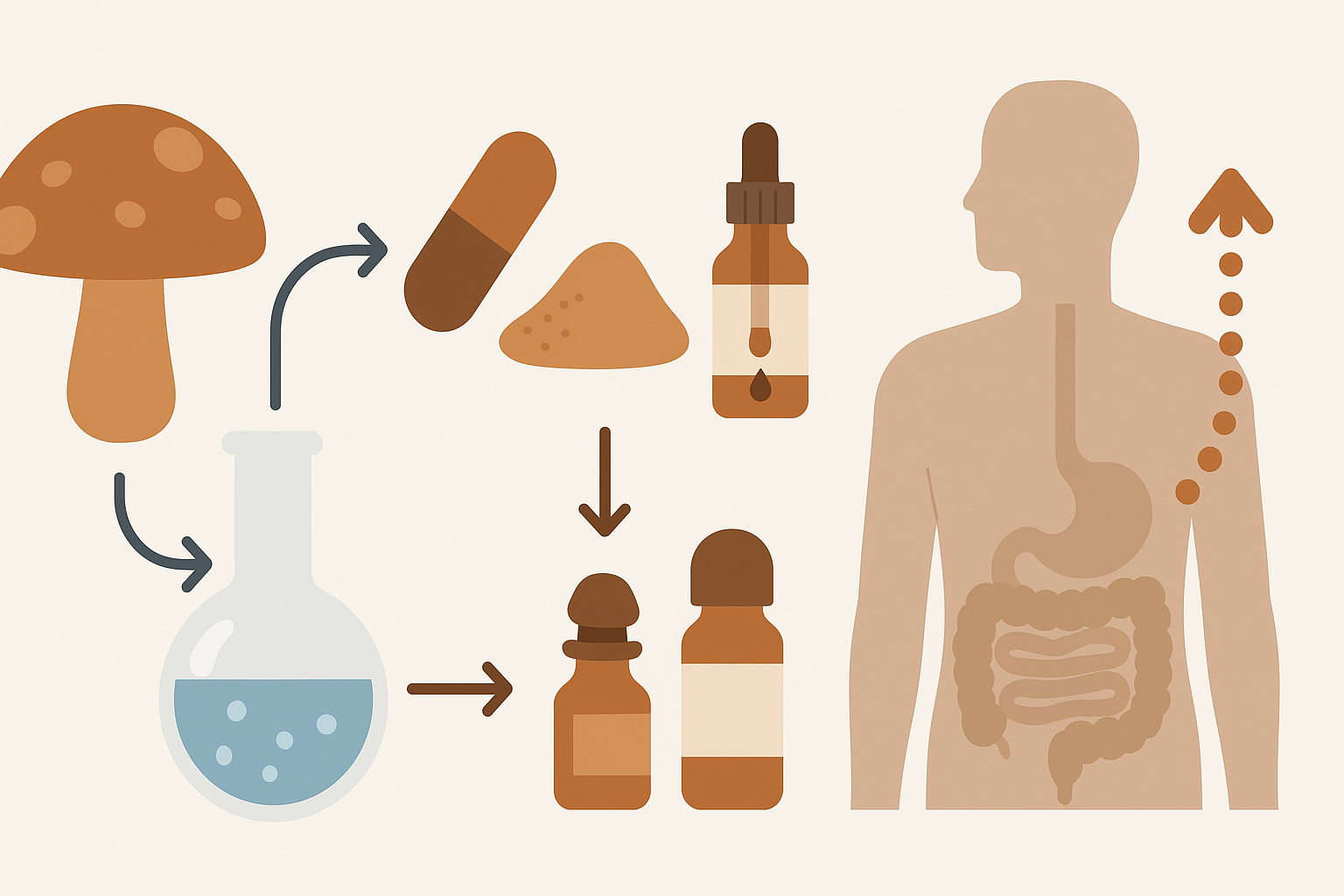Introduction: Enhancing Cognitive Function in the Modern Age
In today’s fast-paced world, the demand for cognitive sharpness, sustained focus, and long-term memory retention has never been higher. Whether navigating academic rigor, high-stakes careers, or aging-related cognitive changes, individuals are seeking sustainable ways to support and enhance their mental performance. One increasingly popular and scientifically intriguing approach involves the use of natural nootropics, specifically a category known as super mushroom supplements. These powerful fungi have garnered attention for their potential to support brain health, protect against neurodegeneration, and improve overall cognitive function.
Unlike synthetic cognitive enhancers, which often come with significant side effects or diminishing returns, super mushroom supplements offer a holistic and evidence-backed alternative. From ancient medicinal traditions to modern clinical studies, these mushrooms are being hailed not just for their nutritional value but for their neuroprotective and neuroregenerative properties. This guide explores the science, benefits, and practical application of super mushroom supplements in unlocking memory power.
You may also like: The Ultimate Guide to the Best Nootropic Mushrooms for Memory and Cognitive Enhancement

What Are Super Mushrooms?
Understanding what are super mushrooms begins with acknowledging their role in both traditional medicine and modern integrative health. Super mushrooms are a subset of functional fungi known for their adaptogenic properties and dense concentrations of bioactive compounds, including polysaccharides, beta-glucans, hericenones, and erinacines. These compounds are known to influence brain function, modulate immune responses, and protect against cellular oxidative stress.
Lion’s Mane (Hericium erinaceus), Reishi (Ganoderma lucidum), Cordyceps, and Chaga are among the most widely studied super mushrooms. Each has its own unique profile of benefits, but many share common traits that make them especially useful for memory and cognitive enhancement. Lion’s Mane, for instance, is well known for its role in stimulating Nerve Growth Factor (NGF), a protein essential for the growth and survival of neurons. This has made it a favorite in neurohacking circles and among those seeking natural remedies for memory loss or cognitive fog.
Super mushrooms differ from culinary varieties due to their high concentration of medicinal compounds and their specific therapeutic uses. While culinary mushrooms provide valuable nutrients, super mushrooms are cultivated and extracted to concentrate their nootropic and immunomodulating properties. Their use spans thousands of years, with documentation in Traditional Chinese Medicine (TCM), Ayurvedic texts, and indigenous healing systems worldwide. In recent decades, growing interest in brain health and longevity has pushed these fungi into mainstream health consciousness.

The Science Behind Super Mushroom Benefits for Memory
To understand the super mushroom benefits for memory enhancement, it is crucial to examine the biological mechanisms through which these fungi affect the brain. Scientific studies have increasingly shown that certain super mushrooms can influence neuroplasticity, reduce inflammation in neural tissue, and promote the regeneration of nerve cells. These effects are particularly promising in the context of age-related cognitive decline and neurodegenerative diseases such as Alzheimer’s and Parkinson’s.
Lion’s Mane mushroom has been shown in preclinical and some human studies to enhance the synthesis of Nerve Growth Factor. This protein plays a key role in the maintenance, survival, and regeneration of neurons, particularly in the hippocampus, the brain’s memory center. By increasing NGF production, Lion’s Mane may help reverse or slow the progression of memory impairment. Animal studies have shown improvements in object recognition, spatial memory, and cognitive performance, with some human trials echoing these findings.
Reishi mushroom, another powerhouse, contributes to memory enhancement through its anti-inflammatory and antioxidant properties. Chronic inflammation and oxidative stress are major contributors to cognitive decline, especially in older adults. By reducing pro-inflammatory cytokines and scavenging free radicals, Reishi creates a more favorable environment for neuronal health.
Cordyceps, primarily known for its energy-boosting and fatigue-fighting properties, also supports cerebral oxygenation and ATP production, which can indirectly improve cognitive performance and memory retention. When the brain receives more oxygen and energy, it performs more efficiently, particularly in areas like focus and recall.
These effects are not merely anecdotal. Emerging studies in neuroscience and nutraceutical science are providing increasingly rigorous evidence that super mushrooms can serve as both preventative and therapeutic agents for cognitive decline.

Super Mushroom Supplement Formulations and Bioavailability
While the individual benefits of super mushrooms are impressive, their effectiveness in supplement form depends on extraction methods, bioavailability, and synergistic formulation. A high-quality super mushroom supplement typically uses dual-extraction processes that harness both water-soluble and alcohol-soluble compounds. This ensures the final product includes the full spectrum of active ingredients.
Beta-glucans, the immune-modulating polysaccharides found in the cell walls of mushrooms, are best extracted with hot water. Terpenoids and phenolic compounds, which offer anti-inflammatory and neuroprotective effects, often require alcohol extraction. Dual-extraction supplements are therefore considered superior for those seeking comprehensive cognitive benefits.
Capsules, powders, and tinctures are the most common delivery formats for super mushroom supplements. Powders may be blended into smoothies, coffees, or teas, while tinctures offer quick absorption through sublingual administration. Capsules are convenient and ensure dosage consistency, though they may not offer the rapid absorption benefits of tinctures.
It’s also important to evaluate the source of the mushrooms. Fruiting body extracts are generally more potent than mycelium-grown-on-grain products, which may contain less active compounds and more fillers. Look for third-party testing, organic certifications, and transparent labeling to ensure product purity and potency. Additionally, combining super mushroom extracts with other nootropics like Bacopa monnieri, Rhodiola rosea, or omega-3 fatty acids can create a synergistic effect, enhancing memory, focus, and mental clarity.
Unlocking Memory Power with a Super Mushroom Supplement
The phrase unlocking memory power with a super mushroom supplement reflects a growing understanding that natural solutions can rival or exceed synthetic alternatives when supported by science and used consistently. The cognitive enhancements provided by super mushrooms are not magic bullets but rather cumulative effects that build over time with regular use and healthy lifestyle habits.
Users often report clearer thinking, improved short-term memory, better word recall, and enhanced creativity after incorporating a super mushroom supplement into their daily regimen. These benefits can be particularly valuable for students, professionals, and older adults looking to maintain mental agility and combat cognitive fatigue.
Memory formation and retrieval are complex processes involving multiple areas of the brain and various neurotransmitters. Super mushrooms exert their influence by supporting the health of neural pathways and optimizing the conditions necessary for efficient brain function. This includes promoting synaptogenesis, supporting mitochondrial health, and regulating neurotransmitter balance.
Moreover, the stress-reducing effects of certain mushrooms, especially Reishi, contribute indirectly to improved memory. Chronic stress impairs hippocampal function and reduces the formation of new memories. By lowering cortisol levels and improving sleep quality, Reishi helps create a mental state more conducive to learning and recall.
Combining super mushroom supplementation with memory-enhancing habits such as mindfulness meditation, regular exercise, and brain-training activities creates a robust strategy for cognitive resilience. The supplements work best as part of a broader wellness approach that includes nutrition, mental stimulation, and rest.

Daily Integration: How to Use Super Mushroom Supplements for Cognitive Enhancement
Integrating a super mushroom supplement into your daily routine doesn’t require major lifestyle changes but does benefit from consistency and intention. Start with understanding your specific cognitive goals—whether it’s improving focus, reducing brain fog, or enhancing memory retention—and choose a formulation that aligns with those needs.
Morning routines are an ideal time to take cognitive-enhancing supplements, especially those that boost energy and focus. Cordyceps and Lion’s Mane, for instance, can be taken in the morning to support productivity and mental clarity throughout the day. Evening supplementation with Reishi can help calm the mind, support sleep quality, and contribute to overnight memory consolidation.
Pairing supplements with healthy fats, such as those from nuts or avocado, can enhance the absorption of fat-soluble compounds in the mushrooms. Similarly, taking these supplements with meals reduces the likelihood of gastrointestinal discomfort and supports steady nutrient absorption.
The key to successful integration is mindfulness. Track your cognitive performance, energy levels, and emotional state over time. Journaling your experiences can help identify which combinations and dosages work best. This level of self-awareness is a hallmark of biohacking and self-optimization communities that leverage nootropic strategies for personal development.
Supplementation alone, however, will not yield optimal results without a supportive lifestyle. Incorporating cognitive behavioral strategies, prioritizing quality sleep, staying hydrated, and engaging in social interactions all contribute to the efficacy of memory-boosting regimens.

The Role of Super Mushroom Benefits in Long-Term Brain Health
Beyond short-term cognitive enhancements, super mushroom benefits extend to long-term brain health and neuroprotection. Chronic exposure to stress, pollution, poor diet, and sedentary behavior can accelerate cognitive decline. Super mushrooms offer a natural defense mechanism by combating these risk factors at the cellular level.
Lion’s Mane has shown potential in supporting recovery from nerve injury and in slowing the progression of neurodegenerative conditions. Studies suggest it may be helpful not only for mild cognitive impairment but also for more serious conditions like Alzheimer’s disease when used as part of an integrative health strategy. The ability of Lion’s Mane to promote neurogenesis represents a groundbreaking potential in the field of natural neuroscience.
Reishi and Chaga, with their high antioxidant content, protect brain cells from oxidative damage, one of the primary mechanisms underlying age-related cognitive decline. Their anti-inflammatory properties also reduce the likelihood of developing chronic inflammatory conditions that can impact brain function.
Cordyceps supports mitochondrial health and energy metabolism in neurons, helping to sustain cognitive performance in older adults and those dealing with chronic fatigue or age-related memory issues. By maintaining the structural integrity of neural networks, Cordyceps helps keep the brain agile, adaptable, and alert.
Regular use of super mushroom supplements as part of a comprehensive health plan can therefore not only improve current mental performance but also serve as a proactive measure against future cognitive decline. This positions them as valuable tools in the emerging field of lifestyle-based neuroprotection.
Why More People Are Asking: What Are Super Mushrooms?
The question what are super mushrooms has seen a surge in public interest due to increasing awareness of nootropics and functional foods. As people move away from pharmaceutical solutions with potential side effects, they are turning toward natural alternatives that offer holistic benefits without compromising safety or efficacy.
Super mushrooms represent a fusion of ancient wisdom and cutting-edge science. They are appealing to a broad demographic: health enthusiasts, students, professionals, and aging adults alike. This versatility and accessibility make them a central topic in discussions around cognitive enhancement and overall wellness.
Part of their appeal lies in their adaptability. Super mushrooms can be consumed in many formats—tea, powder, capsule, tincture—and can be incorporated into a variety of dietary preferences, including vegan and gluten-free lifestyles. Their ability to modulate the immune system, reduce stress, and protect against free radicals adds to their multi-dimensional value.
As scientific validation continues to accumulate, the line between food and medicine is becoming increasingly blurred. Super mushrooms embody this intersection, offering tangible cognitive benefits while also supporting general well-being. This convergence of utility and accessibility is what drives the growing curiosity about what super mushrooms truly are.
Medical practitioners and wellness influencers alike are now incorporating these supplements into integrative health plans. The increasing popularity of functional medicine has only accelerated the public’s interest, making super mushrooms a compelling entry point into broader conversations about natural health optimization.
Choosing the Right Super Mushroom Supplement for Your Needs
With the vast array of products on the market, selecting the right super mushroom supplement can feel overwhelming. The most important factor is clarity on your health goals. Are you looking to enhance memory, improve focus, reduce stress, or support long-term brain health? Each mushroom has strengths that cater to specific needs.
A supplement focused on memory enhancement will likely prioritize Lion’s Mane, possibly in combination with Reishi or Cordyceps for complementary effects. Look for products that clearly state the type of extract used, concentration of active compounds, and source of the mushrooms. Transparent labeling is an indicator of product integrity.
Dosage is another critical factor. Clinical studies often use standardized dosages that may differ from those in commercial products. Understanding the effective dose and aligning it with your routine ensures you reap the intended benefits. Consulting with a healthcare provider or integrative nutritionist can provide personalized guidance, especially if you are taking other medications or have preexisting conditions.
Avoid proprietary blends that obscure the exact quantity of each ingredient. Instead, choose supplements with full disclosure and third-party verification. These quality control measures are essential in an industry where standards can vary widely.
Finally, consider the broader context of your lifestyle. Supplements work best when supported by balanced nutrition, physical activity, stress management, and adequate sleep. When used thoughtfully, super mushroom supplements become not just another health trend but a meaningful investment in your cognitive future.

Neuroplasticity and Super Mushrooms: A Pathway to Lifelong Learning
Neuroplasticity, the brain’s remarkable ability to reorganize and form new neural connections throughout life, plays a crucial role in memory formation and cognitive resilience. As we age or encounter novel experiences, our brains adapt through this dynamic remodeling. Emerging research now suggests that certain super mushroom supplements may actively support neuroplasticity, offering new avenues for lifelong learning and memory reinforcement.
Lion’s Mane mushroom, in particular, demonstrates promising effects on enhancing neuroplasticity. Its compounds, hericenones and erinacines, stimulate the synthesis of Nerve Growth Factor (NGF), which is integral to the development and maintenance of neural pathways. Studies show that regular supplementation may improve not only recall but also the brain’s ability to form new associations—vital for continuous learning in academic, personal, and professional contexts.
Reishi and Cordyceps also contribute indirectly to neuroplasticity by promoting cerebral circulation and reducing inflammation, which in turn optimize the brain’s environment for growth. When inflammation is minimized, the brain can allocate more resources to synaptic remodeling and less to damage control.
This intersection of super mushroom benefits and neuroplasticity represents a powerful opportunity for proactive cognitive training. Whether you’re picking up a new language, mastering an instrument, or adjusting to a new job, supporting brain flexibility through targeted supplementation can provide a significant advantage.
By aligning super mushroom use with mental challenges, individuals can create a feedback loop that reinforces neuroplastic growth. It’s a sustainable model for cognitive advancement, particularly in an era where intellectual agility is a valuable personal asset.

The Future of Cognitive Health: Super Mushrooms in Clinical Research
The growing popularity of super mushroom supplements is now paralleled by an expanding body of clinical research aimed at verifying their benefits through controlled scientific methodologies. While traditional and anecdotal use provides historical context, modern studies are providing the empirical data necessary to bring these fungi into mainstream medical discourse.
Double-blind, placebo-controlled trials are currently underway to evaluate the efficacy of Lion’s Mane in patients with mild cognitive impairment, with early results indicating improvements in verbal memory and attention span. This is particularly promising for aging populations, where the prevalence of dementia-related conditions continues to rise globally.
Reishi’s potential in reducing stress-induced cognitive deficits is also being tested in clinical settings. Some trials suggest its adaptogenic properties may help regulate the hypothalamic-pituitary-adrenal (HPA) axis, which is responsible for the body’s stress response. Better stress management correlates with improved cognitive performance and reduced risk of burnout-related memory loss.
Meanwhile, Chaga and Cordyceps are being explored for their antioxidant and mitochondrial-supporting capabilities. These properties are of particular interest in neurodegenerative diseases where oxidative damage and mitochondrial dysfunction are primary contributors to cognitive decline.
As funding and scientific interest grow, we can expect more comprehensive data on dosage, long-term safety, and synergistic applications. These studies will likely pave the way for integrating super mushroom supplements into preventative health care models and therapeutic protocols for cognitive disorders.
The future of brain health may well be intertwined with the ancient intelligence of fungi. Continued research promises not only validation but also the evolution of personalized nootropic strategies anchored in the potent, natural power of super mushrooms.
Frequently Asked Questions: Super Mushroom Supplements and Cognitive Health
1. What is the best time of day to take a super mushroom supplement for memory support?
The ideal time to take a super mushroom supplement largely depends on the specific mushroom blend and your cognitive goals. For example, Lion’s Mane is often taken in the morning to support alertness and learning, while Reishi is better suited for the evening due to its calming, adaptogenic qualities. Taking Cordyceps earlier in the day may also provide a natural energy boost and promote mitochondrial function throughout your active hours. If you’re using a multi-mushroom formulation, splitting the dose between morning and evening may help optimize the full spectrum of effects. Always consider your personal energy rhythms and consult a healthcare professional if you have sensitivities to adaptogens or supplements.
2. How do different extraction methods impact the effectiveness of a super mushroom supplement?
Extraction methods are a critical factor in the efficacy of any super mushroom supplement. Dual extraction, which uses both alcohol and hot water, is the gold standard for obtaining a full range of beneficial compounds such as beta-glucans and triterpenes. Water extraction alone often misses fat-soluble compounds, while alcohol extraction may neglect polysaccharides essential for immune modulation. Some newer extraction methods utilize ultrasonic or enzymatic technologies to further improve bioavailability. Choosing a supplement with clear labeling on extraction methods ensures you’re getting the full range of super mushroom benefits.
3. Can a super mushroom supplement help with emotional regulation and stress resilience?
Yes, several mushrooms used in nootropic formulas have well-documented effects on emotional balance and stress modulation. Reishi and Chaga are particularly effective at regulating the hypothalamic-pituitary-adrenal (HPA) axis, which governs the body’s response to stress. These mushrooms may lower cortisol levels and help buffer the neurological effects of chronic stress, improving mood stability over time. The adaptogenic nature of these fungi makes them particularly useful in high-pressure environments, such as academic or professional settings. Emotional resilience, in turn, supports better focus and memory retention, indirectly enhancing the effects of other cognitive enhancers in the stack.
4. Are there any synergies between super mushroom supplements and other nootropics?
Absolutely. A super mushroom supplement can be effectively paired with other natural nootropics like Bacopa monnieri, Rhodiola rosea, or L-theanine to enhance cognitive outcomes. For instance, combining Lion’s Mane with phosphatidylserine may support both neurogenesis and cell membrane health. Adaptogens like Ashwagandha complement Reishi by further reducing cortisol and promoting mental clarity. These synergistic stacks can optimize brain function across multiple domains including attention, working memory, and long-term recall. However, these combinations should be approached cautiously and ideally under the supervision of a practitioner familiar with integrative nootropics.
5. How long does it typically take to experience the benefits of a super mushroom supplement?
The effects of a super mushroom supplement usually build gradually rather than delivering immediate results. Most users report noticeable cognitive improvements within two to four weeks of consistent use. Lion’s Mane, for example, often requires several weeks to influence neurogenesis and manifest memory enhancements. That said, energy and mood benefits from Cordyceps or Reishi may be felt sooner, sometimes within a few days. Keeping a daily journal can help track subtler changes in cognition and performance over time.
6. Are there any dietary factors that enhance or inhibit the absorption of super mushroom supplements?
Yes, dietary context significantly affects the absorption of active compounds in a super mushroom supplement. Taking the supplement with a meal, especially one that includes healthy fats, can improve the bioavailability of fat-soluble triterpenes found in Reishi and Chaga. On the other hand, excessive alcohol or caffeine intake may interfere with the stress-regulating effects of adaptogenic mushrooms. Including fermented foods or a probiotic may also support gut health, thereby optimizing the body’s ability to assimilate these complex polysaccharides. Timing and pairing with the right nutrients can enhance the overall potency and consistency of the supplement’s cognitive benefits.
7. Why is sourcing important when choosing a super mushroom supplement?
Sourcing directly impacts the purity, potency, and safety of a super mushroom supplement. Mushrooms grown in polluted soil or harvested from uncontrolled environments can accumulate heavy metals and pesticides. Premium supplements typically use organic, non-GMO mushrooms cultivated on wood rather than grain, which results in a higher concentration of bioactive compounds. Fruiting body extracts, as opposed to mycelium on grain, are especially important for achieving clinically relevant dosages. Transparent sourcing, verified through third-party testing, is one of the best indicators of a product’s quality and efficacy.
8. Exploring Super Mushroom Supplement Safety for Long-Term Use
For most healthy adults, long-term use of a super mushroom supplement is considered safe when taken within recommended dosages. However, as with any bioactive compound, there is always the potential for individual sensitivity or interactions with medications. Some individuals may experience mild gastrointestinal discomfort or allergic reactions, especially if they have mold sensitivities. Pregnant or nursing women and individuals with autoimmune conditions should consult their healthcare provider before beginning any new regimen. Monitoring biomarkers like liver enzymes or cortisol levels during extended use may provide additional insight into how your body is responding to long-term supplementation.
9. Can a super mushroom supplement support creative thinking and idea generation?
Yes, there is growing anecdotal and preliminary scientific evidence suggesting that a super mushroom supplement, particularly those containing Lion’s Mane, may enhance creative cognition. By stimulating NGF production and promoting the formation of new neural pathways, these mushrooms can increase cognitive flexibility, a key component of divergent thinking and creativity. Users often report improved brainstorming capacity, faster association of ideas, and more fluid problem-solving abilities. These enhancements are particularly relevant for professionals in creative industries or academic research fields. When combined with activities that nurture imagination, such as journaling or artistic practices, the cognitive benefits may be amplified.
10. What Are Super Mushrooms Doing for the Future of Brain Health Innovation?
The future of cognitive healthcare is rapidly evolving, and what are super mushrooms doing within this field is nothing short of revolutionary. As science continues to unravel the neurobiological mechanisms behind these fungi, new applications are being explored in personalized medicine, mental health care, and even digital therapeutics. Advances in biotechnology may soon allow for custom-formulated mushroom blends tailored to individual genetic and epigenetic profiles. Beyond capsules and powders, delivery formats such as transdermal patches and nano-emulsified tinctures are also being developed to enhance absorption and compliance. This fusion of ancient wisdom with cutting-edge technology positions super mushroom supplements as a cornerstone of the next generation of brain health solutions.
Conclusion: Empowering Your Brain with Nature’s Intelligence
As we navigate the complexities of modern life, the desire to enhance our memory, protect our mental faculties, and achieve peak cognitive performance continues to grow. Unlocking memory power with a super mushroom supplement is not just a trend but a scientifically supported, holistic strategy rooted in both ancient healing wisdom and modern research.
The evidence supporting the super mushroom benefits for memory enhancement and long-term brain health is compelling. From stimulating neurogenesis to reducing oxidative stress and supporting emotional balance, these fungi offer a multi-layered approach to cognitive wellness. Their versatility, safety profile, and adaptability make them an invaluable tool for anyone committed to mental vitality.
For those still wondering what are super mushrooms, the answer lies in their extraordinary capacity to support the body and mind in synergistic harmony. They represent a bridge between the old and the new, the natural and the scientific. And in doing so, they provide a powerful reminder that some of the most effective solutions for human health come not from a laboratory but from the forest floor.
Choosing the right super mushroom supplement, integrating it mindfully into your daily routine, and pairing it with healthy cognitive habits can help you unlock your brain’s full potential. It is a journey of optimization, resilience, and intentional living—one that begins with a single step rooted in nature’s intelligence.
Further Reading :
Super Mushrooms: Mushroom Superfoods
Here’s What You Need to Know About These 6 Superfood Mushrooms
